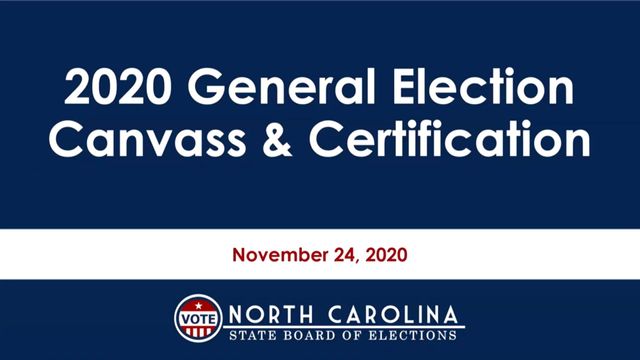Editorial: Elections Board members' job is to advocate and protect voters, not partisanship
Friday, Nov. 27, 2020 -- The work of the state and local elections boards is challenging enough without members badgering staff and acting to get boards mired in constant and intractable partisan bickering and legal wrangling.
Posted — UpdatedIt’s happened again. A former state legislator gets placed on an important state board. That ex-legislator cares only about the wishes of the legislative leaders and their partisan agenda and NOT working on behalf of ALL the people of North Carolina. All too often in recent years, the narrow demands of legislative leaders are in stark contrast to the best interests and needs of North Carolinians.
The board did not change any laws and did not act outside the authority that the legislature assigned it. It did not act in a partisan way – neither on behalf of Democrats nor Republicans – but in the best interest of the state’s voters and regardless of their affiliation.
While Tucker claimed “Democrats filed 416 lawsuits nationally which created chaos, overwhelmed the post office,” he did not mention lawsuits and challenges filed by Republicans. He didn’t bring up the operational changes ordered by Postmaster Lewis DeJoy that jeopardized the timely delivery of ballots to voters or the return of those cast ballots to board of elections. Nor did he say that it was President Donald Trump, during an appearance in Wilmington, who famously urged North Carolina voters to cast ballots twice – a violation of state and federal law.
The actions of the State Board of Elections were scrutinized by the highest courts in the state and nation. None objected to the board’s actions to make sure as many legal voters as possible got to cast their ballots properly and get them counted.
The board’s actions – including the extension of time to receive mail-in ballots – didn’t go beyond policies already in place.
With the unprecedented number of mail-in ballot requests – which resulted in more than a million being cast that way – the extension wasn’t arbitrary. Every ballot had to be postmarked no later than Election Day. Further, the deadline for receipt of those ballots was the same as was already in place for absentee mail-in ballots cast by those overseas in the armed services. This was nothing new.
Most striking of all was that the other Republican on the state board, Stacy Eggers of Boone, voted with the three other Democrats to certify the election results. And, while he offered polite support for Tucker’s comments, he stressed that it was the main priority of the members of the board to “ensure that we have the safety and confidence of all of the voters of North Carolina and our actions to follow the law … to apply the law and not to make it.”
State Board Chairman Damon Circosta backed up Egger’s sentiments. “We're not supposed to comment on which political party we'd like to see triumph or which political party we'd like to see win elections,” Circosta said at the conclusion of Tuesday’s State Board meeting. “That's not our job. Our job is to make sure that the 5.5 million people who voted in this state had their voice heard.”
That’s what happened -- to the credit of the staff, the hundreds of state and local volunteers and the Democrats and Republicans on the local and state elections boards -- amid the most challenging time for an election in our nation’s history.
Tucker needs to find it in himself to make that his priority too. The work of elections boards is challenging enough without members badgering staff and acting to get boards mired in constant and intractable partisan bickering and legal wrangling.
If Tucker can’t accept that, he should find another place where his brand of partisan service is appropriate. The Board of Elections is not the place.
Related Topics
Copyright 2024 by Capitol Broadcasting Company. All rights reserved. This material may not be published, broadcast, rewritten or redistributed.






